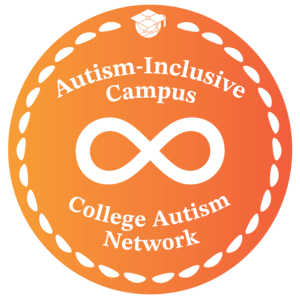Consider Becoming a CAN Autism-Inclusive Campus Designated Institution
About the Autism-Inclusive Campus Designation
The College Autism Network’s “Autism-Inclusive Campus” designation (AICD) is awarded to US and Canadian colleges and universities—regardless of size, type, classification, or mode of delivery—that strive to create and maintain environments that ensure the inclusion and success of autistic and other neurodivergent people—including students, faculty, and staff—in all aspects of their community and mission. The vision of an inclusive campus is one where autistic and other neurodivergent people are able to live authentically, whether or not they choose to disclose their neurodiversity; develop personally and professionally; contribute as valued members of a diverse community; and experience a sense of belonging.
Postsecondary institutions apply to be assessed for the designation and work with the College Autism Network (CAN) to achieve it. Throughout the designation-seeking process, CAN provides consultants, evidence-based resources, and iterative feedback. After the designation is achieved, postsecondary institutions may continue to work with CAN to improve autism inclusion on their campuses and participate within a community of other AICD institutions to share their journey.
Inspiration
The College Autism Network’s “Autism-Inclusive Campus” designation is inspired by AsIAm’s model for helping higher education institutions (HEIs) to enhance opportunities for autistic learners and recognize campuses that have succeeded. AsIAm, Ireland’s National Autism Charity, partnered with Dublin City University and Specialisterne Ireland to develop a set of guiding principles to create campus environments that improve autistic learners’ likelihood of full participation. Campuses implementing the framework successfully receive the “Autism Friendly HEI Award.” This initiative “aims to equip Autistic students to meet the challenges of academic and social life, combating stigma and recognising the diverse experiences of students. It relates to the whole campus experience.”
CAN’s “Autism-Inclusive Campus” designation is a vital next step in fulfilling our commitment to enhancing the access, experience, and outcomes of autistic college students. Through advocacy, research, and training, CAN’s diverse network of experts, professionals, neurodivergent community members and their allies strives to transform postsecondary institutions into environments where neurodivergent learners can thrive. AICD broadens our advocacy for autistic college students to include support for neurodivergent faculty and staff as a means of empowering them to serve as mentors and role models and of fostering a positive campus climate for neurodiversity.
Principles
Postsecondary institutions that have achieved CAN’s “Autism-Inclusive Campus” designation are guided by the following principled actions that autism-inclusive campuses take to ensure that autistic and other neurodivergent people thrive individually and collectively within their environments:
- Reduce barriers for autistic and other neurodivergent individuals by employing a holistic approach; providing differentiated and, when possible, individualized accommodations and support services; and engaging in interactive dialogue about the individual’s specific and the collective’s shared needs.
- Engage in a variety of evidence-based efforts to improve access, experience, and outcomes for autistic and other neurodivergent individuals in their roles as students, faculty, and staff. In the case of students, employ evidence-based approaches to maximize efforts to ensure autistic and other neurodiverse students enter, are retained, and graduate.
- Promote the empowerment of autistic and other neurodivergent individuals through creating an environment that encourages and responds positively to their self-advocacy. In such an environment, autistic and other neurodivergent individuals are encouraged to discover and express their own needs, set their own goals, and define their own standards of success.
- Ensure autistic voices and experiences, along with those of other neurodivergent individuals and collectives, are included and considered when change that affects them is being planned, following the call of the autistic community that there should be “nothing about us without us.
- Proactively explore the possibilities for structural and cultural change to incorporate autistic and other neurodivergent individuals and collectives as contributors to campus communities and society.
- Highlight the unique contributions autistic and other neurodivergent individuals as well as collectives make to their institutions, fields of study, and society in order to promote their value and advocate for their increased inclusion and support for their success.
Autism-Inclusive Campus Designation Committee
A special thank you to our Autism-Inclusive Campus Designation Committee who has put in hours of work to create the principles and rubric by which to evaluate campuses.
- Brittany L. Jackson, Ed.D. (Chair)
- Cynthia Cruz
- Wendy Hobbs
- Steven Isaacson
- Hunter Mastin
- Amy Rutherford
- Kelly Searsmith



